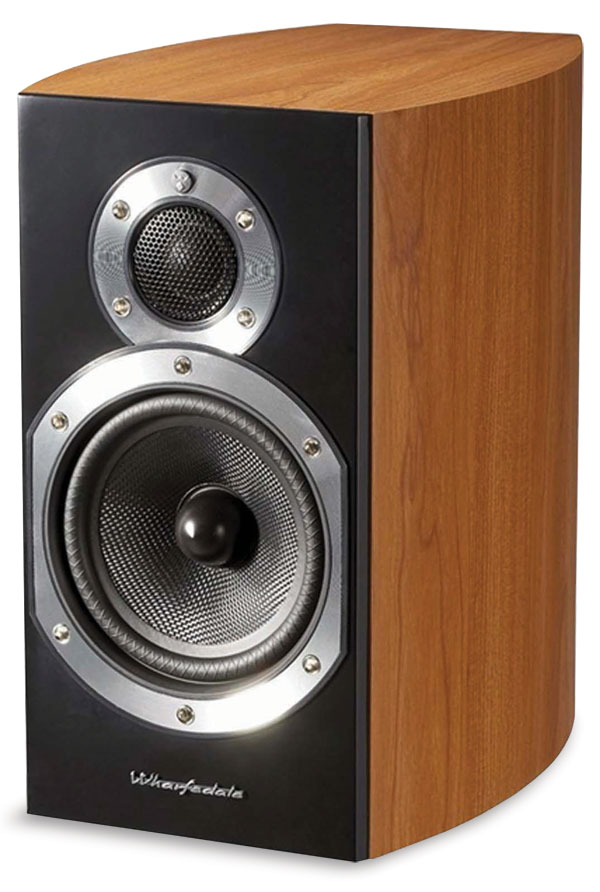| Columns Retired Columns & Blogs |
This is my speaker, paired with NAD C 326BEE. The sound is great and easy to listen too.
The Diamond 10.1's reproduction of the highs went hand in hand with its ability to render all transients with lightning speed and no trace of sharpness, blurring, or compression. My acid test for percussive transients is Orphée, from John Zorn's Mysterium (CD, Tzadik TZ8018). David Shively's panoply of rapid-fire percussion was rendered with perfect clarity, every attack and overtone intact. And with less complex percussion recordings, such as Max Roach's chugging in "Terpsichore," from Herbie Nichols' The Complete Blue Note Recordings (CD, Blue Note CDP 8 59352 2), Roach's drum kit blended in perfect, toe-tapping tunefulness with the rest of the trio.
On the acoustic-bass front, Chuck Israels' solo in "'Round Midnight," from the Bill Evans Trio's At Shelly's Manne Hole, Hollywood, California (CD, JVC JVCXR-0036-2), sounded woody and rich. Similarly, Reginald Veal's bass in Bob Dylan's "Closer to You," from Cassandra Wilson's Thunderbird (CD, Blue Note 63598 2), was open, airy, and forceful. The Diamond 10.1 was able to reproduce dramatically realistic electric-bass timbres as well. The timbres of Fred Frith's bass guitar in "Dig," from his Speechless (CD, ESD 81542), were crisp and clean. And in Eberhard Weber's Endless Days (CD, ECM 1748), Rainer Brüninghaus lays down a big, blowsy, spacious bass-synth continuo as a backdrop to Weber's melodic noodlings on fretless bass guitar. Through the 10.1, the two were integrated perfectly—both instruments were clean, their individual timbres easily discernible.

However, the acid test for bass definition speed and clarity are the descending and ascending bass-synth lines in Spaceship, from Philip Glass's Einstein on the Beach (CD, Nonesuch 79323-2). These rapidly pulsing lines sounded perfectly linear through the Wharfedales, with no strain or coloration, and nary a trace of sluggishness or lack of bottom-end definition.
In short, I'm surprised to have so many good things to say about how much bass so small a speaker could reproduce in a room as large as mine.
The Wharfedale was also able to kick ass with loud rock music. With "Swing Shift," the first track of Meridian Voice's debut CD, Atypical Symmetry (available from cdbaby.com), this jazz-rock quartet filled my large listening room with 95dB kicks and blasts without any compression or strain. On the orchestral front, David Chesky's Concerto for Electric Guitar and Orchestra (CD, Chesky HQCD351), Chesky relies quite heavily on percussive blasts with wide dynamic range as a backdrop for Bryan Baker's performance of the angular, through-composed shred-guitar melodies. The 10.1s reproduced this work's fortissimos with a good sense of drama and ease—again, much more than I expected from a bookshelf speaker of this size.
The piece that showed off all the Wharfedale's strengths at once was Messiaen's Méditations sur le mystère de la Sainte Trinité (CD, ECM New Series 1494). For this work for pipe organ, which demands much of both performer and speakers, organist Christopher Bowers-Broadbent puts his instrument through the greatest variety of timbral and textural sonorities: from subtle, airy whistles, to brash dissonant clusters, to thundering fortissimos. With the 10.1s there was never a sense of definition lost, even in the most densely written passages, and the pedal notes were reproduced with clarity and consistency. I never felt that any lower-register notes had gone missing in action, or had been timbrally altered in the slightest.
Comparisons
I compared the Wharfedale Diamond 10.1 ($350/pair) with Paradigm's Atom v5 ($250/pair) and Epos's ELS3 ($350/pair when last offered, footnote 1).
Although the well-balanced Paradigm Atom v5 had a similarly gorgeous midrange, it resolved significantly less detail than the Diamond 10.1. The Atom's midbass was a bit richer, and not quite as clean or as extended as the Diamond's, and its high frequencies seemed less extended and somewhat less clear.
The Epos ELS3 resolved as much detail as the Diamond 10.1, but while its highs were as extended as the Wharfedale's, the latter's upper register sounded more delicate and refined. The Epos's bass was as extended as the Wharfedale's, and just a touch cleaner. As for high-level dynamics, the Epos wasn't quite as good as the Wharfedale, but was better than the Paradigm.
Payoff
Wharfedale has a winner in the Diamond 10.1. In today's market of stiff competition among affordable loudspeakers, the 10.1 presents extraordinary value for money, with many strengths that suggest a considerably higher price, and no meaningful weaknesses. And while it's been many years since I heard the Diamond 9.1, my memory and review comments indicate that the Diamond 10.1 is a considerable improvement.
Finally, I thank Stephen Mejias for steering me toward the many enjoyable hours I've spent with the Diamond 10.1. Kid, you can assign me an equipment review any time.

This is my speaker, paired with NAD C 326BEE. The sound is great and easy to listen too.

I am in the market for speakers for my Rotel RA-1520 (2*60W) integrated amp.
These will be located in my office and not a large room and will be sitting on either side of my office desk so bookshelf is preferred. I listen to a variety of new/old rock, jazz, plus some top 40 stuff (easy on the brain). I am currently using Boston Accoustics T-1030 which I bought in the mid 90's and had recently refoamed.
My setup is:
Rotel RA-150
Cambridge Dacmagic Plus
iTunes / Channel D Pure player.
As I am not really near an urban centre, I am limited to what I can listen to in person.
on my list of potential candidates are:
B&W 685 (or even CM-5 if they go on sale) - heard the 685 which sounded amazing but was not ready to commit.
Wharfedale Diamond series - great reviews but have not listened to them.
KEF Q series (I did hear these in a loud environment and did like them).
PSB Alpha B1 - recommended by this website/magazine ;)
Any recommendations or suggestions would be appreciated.